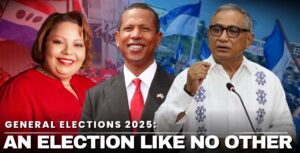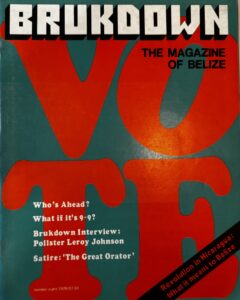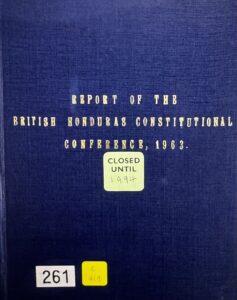Note: After a short hiatus, TIME COME is back with regular posts. In this coming period, TIME COME will keep some focus on political reform matters, including dissecting the messy tenure, closure and report of the People’s Constitution Commission (PCC). Indications are that the report will not be worth the expenditure of too many braincells nor the waste of ink. What’s next? TIME COME will also be giving more attention to a broader set of national policy issues and seek more guest pieces. The latter is the case for this offering of TIME COME as Dr. Harold Young pens a new piece. Welcome back subscribers and readers! (your host, Dylan Vernon)
By Harold A. Young, Guest Post#3, May 19, 2025. (See his bio at end).

If the general election of 2020 is characterised as a swing election led by a “Blu’ tsunami, then 2025 is the “Red” meltdown washed by a “Blu” high tide. This is not my forum for detailed analysis but here are a few thoughts.
I published the sections below prior to the election in 2020. Generally, and unfortunately, nothing has changed. The People’s United Party (PUP) won 26 seats to United Democratic Party’s (UDP) 5 in 2020. While the winning margins were much bigger than in 2020, it is the same result in 2025. Since independence, no ruling party has done as well or better in the subsequent election. Some revisited sections below, however, read as if they were written for 2025 and not 2020 election.
The More Things Change…
“When politicians defecate, it runs downhill and mire us in distrust, cynicism, and selfishness. It is not all their fault. Voters besiege politicians for handouts and special besiege backrooms for favors. A modern democracy is a full-time contact sport, and we have to play our individual and collective parts. Elections are important events in a democracy, but a living democracy requires ongoing engagement between the government and the governed. Politicians trying to win and hold power breathe for three things: (1) Votes, (2) Governing/public policy, i.e. being in power, (3) Votes.
That we want free and fair elections to cast our votes is understood, but what we/voters are most concerned with is what goes on in #2. That is what happens between elections. This is what really shapes our lives. The elite, while harbouring some of the same feelings about politicians, are less affected. They are insulated by wealth and the ability to “cut paa 2 side”, as appropriate. The majority, however, are paddling doreys in the sewage flowing downhill.
So, do elections make a difference? They can. Will elections in 2020 make a difference? Maybe. Can we improve the odds of improved governance? Yes, we can! Yes. Perfect BUT (Caveat in very large print) it is really hard. Belize needs all sorts of things done, fixed, reformed [transformed], removed, added and reworked. It is a lot and too much to cover here.
Besides, no single thing will do it. There is no magic silver bullet. There are things that are necessary but not sufficient in themselves. Necessary are the civic, business and professional associations/organizations, media, and unions. These entities must grow spines and [intelligently] champion the interests of their members and broader constituents for the good of the country – none are sufficient alone.”

Some Current Observations
- The country still has a shallow democracy which offers simple process to elect our representatives and at the same time maintain the status quo for elite interests, clientelism (voters directly incentivised by handouts and special interest securing favour through campaign donations used to incentivise voters to vote for those who dole favours to special interests- yes, it’s a loop!).
- The media breathlessly spins stories and narratives almost like a political party to ‘maintain the status quo for elite interests, and clientelism (voters directly incentivised by handouts and special interest securing favour through campaign donations used to incentivise voters to vote for those who dole favours to special interests- yes, it’s a loop!). The media has demonstrated its power but sometimes most sound like de facto opposition parties.
- The UDP’s fracture was a gaping sore oozing bile as personalities clashed over the party’s power to maintain the status quo for elite interests, and clientelism (voters directly incentivised by handouts and special interest securing favour). The ongoing dumpster fire (Tracy faction vs Shyne faction) within the UDP offers at least two key insights: quality and vision of leadership (plural) matters; the current electoral system perpetuates the two dominant/traditional parties. Calls for credible alternative parties are in vain.
- The PUP government performed well enough to win the election in 2025. While we are aware of internal factions, there are no visibly serious cracks in the governing coalition led by PM Briceno. While the PUP’s popular vote increased by 10 % over 2020 and the decreased by 11% for the UDP, the almost record low voter turnout reflected the apathy and cynicism engendered by the system that facilitated an election to ‘maintain the status quo for elite interests, and clientelism (voters directly incentivized by handouts and special interest securing favor through campaign donations used to incentivize voters to vote for those who dole favors to special interests- yes, it’s a loop!). Projections about 2030 are premature but see # 3 above.
- Unions are campaigning for salary increases but all seem very transactional as they seem opposed to transformation in any sense. Their relationship with the administration remains adversarial, transactional and reactive.
Holding Pattern
 Belize fundamentally has the same constitutional system since 1964 when British Honduras won self-government. The same party (PUP) in power in 1964 was returned to office in 2020 and 2025 by defeating the UDP (formed in 1974), the successor party to the National Independence Party (NIP) in the elections in 1965. Belize, therefore, is systemically in a holding pattern. It would be unfair to say NOTHING has changed but, systemically, INCREDIBLY LITTLE has changed. We have been complaining about the same things since independence including corruption, poverty/disparities, lack of transparency, poor representation, and personal insecurity.
Belize fundamentally has the same constitutional system since 1964 when British Honduras won self-government. The same party (PUP) in power in 1964 was returned to office in 2020 and 2025 by defeating the UDP (formed in 1974), the successor party to the National Independence Party (NIP) in the elections in 1965. Belize, therefore, is systemically in a holding pattern. It would be unfair to say NOTHING has changed but, systemically, INCREDIBLY LITTLE has changed. We have been complaining about the same things since independence including corruption, poverty/disparities, lack of transparency, poor representation, and personal insecurity.
The People’s Constitutional Commission (PCC) was given a broad legal and funded mandate to educate, consult and recommend comprehensive enhancement, reforms and amendments (or a draft constitution for consideration). The political space granted was squandered through a combination of ineptitude, incompetence, self-interest, and indifference. It’s an opportunity lost as it has not presented to the PM a coherent and/or actionable product worthy of serious consideration.
But don’t take my word for it. Read it yourself. I am sure some have, as evidenced by the PCC Act amendment to delay the obligation of the PM to table the report in the House.
The call is to critically reconsider what we are accepting, what we support and what we are doing. This is suggested if we are serious about not just growing the economic wealth “pie” but redistributing how people access, profit and enjoy the ‘pie’ and growth. If the pie grows by 10% but 90% of the people still share 1% of the growth benefits (or, 10% of the people take 9% of the growth benefits) we will continue to complain and be plagued by corruption, poverty/disparities, lack of transparency, poor representation, and personal insecurity. We will vote again in 2030, again.
U betta Bileez it!
 Harold A. Young is an attorney-at-law and earned his PH.D. in Philosophy (Political Science) from Georgia State University (GSU). Harold has practiced law, worked in public health, adjunct at Oglethorpe University and Georgia state University and as an Associate Professor at Austin Peay State University where he lectured in politics and law. His research interests include Belizean politics, electoral reform and judicial politics
Harold A. Young is an attorney-at-law and earned his PH.D. in Philosophy (Political Science) from Georgia State University (GSU). Harold has practiced law, worked in public health, adjunct at Oglethorpe University and Georgia state University and as an Associate Professor at Austin Peay State University where he lectured in politics and law. His research interests include Belizean politics, electoral reform and judicial politics
